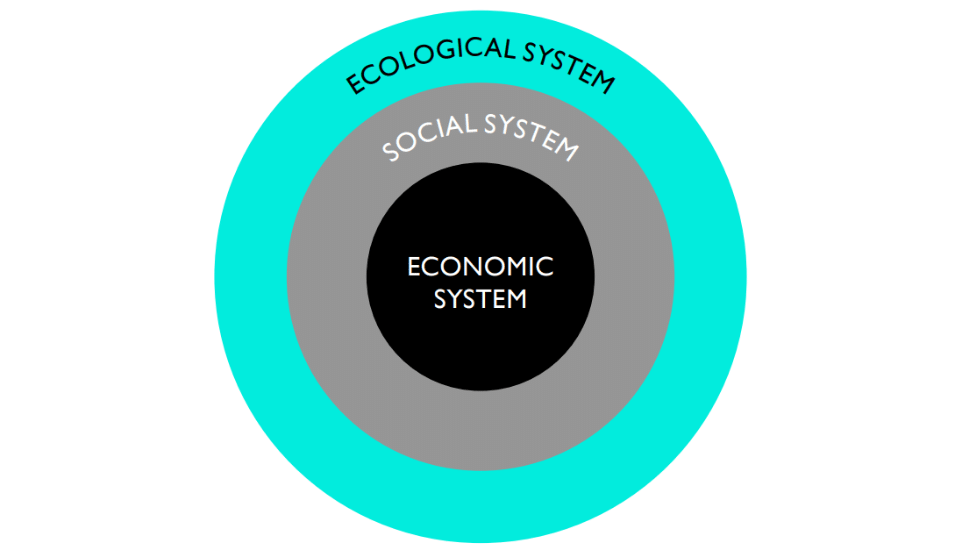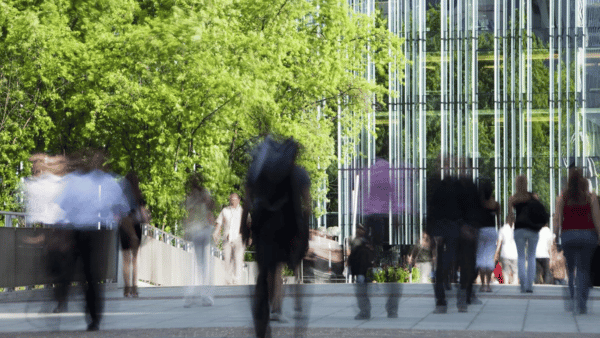In the first of a two-part series, Andy Thornton and Jahnvi Singh propose why nurturing the right workforce capabilities is a critical leverage point for businesses to build their capacity to purposefully transform, adapt and respond positively to an unpredictable and complex world.
Today’s business landscape shows many symptoms of the fragile, unbalanced and degenerative world that our Design for Life mission seeks to address. Economically, high levels of inflation and the cost-of-living crisis are increasing operational costs and limiting customers' ability to spend.
Our interdependence on environmental systems can also no longer be so conveniently ‘externalised’. As fragilities in supply chains are exposed and unavoidable climate impacts rise, so too does the pressure on business leaders to satisfy and placate risk-averse shareholders.

Design for Life
Read our mission enabling people, places and the planet to flourish in harmony.

Shifting towards a life-centric business
Capabilities need to evolve for a regenerative economy.
The dynamic labour and skills market is equally disrupting the social sphere. The aftereffects of the pandemic and other factors continue to place pressure on job vacancies and hiring, where supply and demand are out of balance. Workplace stress, work-life balance, and ‘conscious quitting’ are contributing to higher expectations of employers, particularly among the under-40s. Technology, as it has always done, will continue to disrupt our notion of work and the roles we perform. The dynamism and acceleration of emerging technologies, such as AI, are now exceeding companies' ability to deploy and scale appropriate retraining programmes.

Our complex, interconnected systems are experiencing a polycrisis, radically disrupting business-as-usual.
In this blog, we argue that the route to a regenerative economy will demand many established enterprises embark on a purposeful transformation. One that goes far beyond the mindset of minimum compliance towards environmental, social and governance (ESG) and related standards. For many, this is no easy task. It will demand the ability to culturally innovate, driving positive change by equipping each employee with the capabilities to continually evolve and learn new skills, as part of a lifelong learning organisation.
A regenerative business revolution awaits
In a nutshell, change is arriving faster than we can predict or prepare for. It is, in fact, already here. But at the RSA we’re not only optimistic about leaving our degenerative world behind, but we’re also already actively envisioning, convening and co-designing a better future that is resilient, rebalanced and regenerative.
We believe the world is in the midst of the biggest paradigm shift in business during the lifespan of the RSA itself, born over 260 years ago during the white heat of the Industrial Revolution. With this comes new and novel mindsets that innovate to enable change. Given that, even relatively recently, we’ve demonstrably shifted from goods and products delivered in a productivity-centric manner to information and services delivered in a human-centric manner, such mindset (r)evolutions are not unprecedented.
It’s therefore perhaps more pertinent to ask: who is awake and alert to our new, life-centric reality? As author William Gibson famously said: “The future is already here, it’s just not very evenly distributed.”
We see a future for business that moves from a prescriber of processes for productivity, that maximises profit above all else, to one that allows enterprise to become an evolving catalyst of positive change, transforming profit into prosperity for people and planet.
With this in mind, it’s imperative that business leaders not only recognise this sea change in the value and values, organisations need to be striving for in the 21st century, but also to take the courageous first steps into the blue ocean of this relatively uncharted terrain. The early-mover advantage is significant for those bold enough to lead, drive and influence this nascent space.
Some may call this the fourth Industrial Revolution, or the transition from the Information Age to an ecological one. Whatever the preferred epochal framing, at the RSA we believe it’s vital this shift is sensitively bridged, not a Noah’s Ark of the 'chosen’ and the ‘forsaken’. Industries should be fostered to adopt and adapt to the new normal, rather than be left behind to compete for the scraps of survival.
So, given such a disruptive status quo, and the need to navigate to bold new horizons at pace, how might we create the capacity for business to not only rapidly adapt to, but thrive in, conditions of such uncertainty and complexity, while doing the right thing to bring about this more purposeful future in the process?

Purposeful business transformation through regenerative innovation
The first thing to acknowledge is not to fight the tide of change. At its root lies purpose. A purposeful economy is a future economy. Among millennials and Gen Z, it’s increasingly the current economy. Purpose-led companies achieve stronger market share gains and grow on average three times faster than competitors whilst maintaining higher customer satisfaction. Certified B Corporations are also proven to have better growth, retention and staff engagement than their peers.
However, particularly for established and incumbent market leaders, an authentically purposeful enterprise isn’t something you can necessarily buy ‘out of the box’ from a consultancy, or simply transform into overnight. As the increasing spotlight on ESG criteria from activist investors shows, the transformation will require a new relationship with the triple bottom line that moves beyond adhering to compliance. While ESG compliance is vital, exponential results in business performance will be enabled by radically different mindsets and business models, rather than simply meeting the bare minimum regulatory requirements.
ESG as the mechanism to validate authentic purpose may not survive the current turbulence and backlash, but the underlying causes behind the symptoms of ESG are not going away. There is no thriving future on a 2.7°C world and no viable plan (or planet) B.
Achieving such an ambitious transformation will demand the ability to innovate in a certain way. Not only to do something new, in a new context (that new context being our fast, unpredictable and interconnected world), but to do so in favour of more meaningful ends. Yes, innovation in a crisis is critical in adapting to shifting needs and growth, but 61% of business leaders also believe purpose nurtures a culture of innovation more so than material incentives. Thus, an exclusionary or extractive response to a crisis will be a woefully insufficient motivator.
Our theory of change is that more apt responses are accelerated by future-proofing the wider workforce. The compound effects of thousands of decisions taken by employees every day can amount to a significant shift in not only how values manifest themselves behaviourally, but also what metrics, targets and outcomes are authentically valued across the organisation – particularly in terms of its overall purpose and the chosen methods to realise it.
To react and respond effectively, competently and appropriately to the emergent ‘new normal’ will therefore only be possible through the embedding of necessary capabilities and resources not only throughout sustainability teams and other cadres of willing changemakers but within each employee. Alongside the stresses and strains of employee attraction and retention, such vital change also enables the reinvention of employer organisations as spaces to enable lifelong learning throughout an individual's ever-evolving career.
Capabilities encompassing mindsets, values and worldviews
But what are such necessary capabilities? Capabilities go much deeper than just tangible skills. They are the innate competencies behind ‘how we show up’ at work. They also encompass the intrinsic competencies necessary for making sound decisions when navigating uncertainty and complexity. If disruption isn’t going away anytime soon, neither is uncertainty. If purpose is also here to stay for the long term, it comes with the complexity of delivering multiple forms of value (profit, people, planet) without compromise.
Our attitudinal mindsets (ie, our inherent response to external stimuli), values (ie, our inner guiding principles), and worldview (ie, our perception of how the world works) will be critical as a compass to know how each of us will react to situations that demand an innovative response. And bear in mind, all responses will need to be innovative in some way. It makes sense therefore to ensure decisions made under such improvisational duress are as consistent and coherent with the wider business mission and purpose as possible.
Why? Because inwards is where we all turn when there is no playbook to guide us. Without a single source of absolute truth or wisdom to ask what to do, we go to our intuition and our gut feeling - what feels right.
In a disruptive and purposeful world, the guiding forces that inherently drive our behaviour – our attitudes – are therefore naturally more enduring and desirable competencies than transient, role-specific skills, which soon become insufficient and obsolete. As a case in point, the rapid degeneration of core skills, exacerbated by the accelerating pace of new technologies such as AI and automation, means that almost half of them are expected to change in the next five years.
Such ‘hard’ skills are best thought of as rigid, brittle and perishable. In contrast, ‘soft’ skills are flexible, malleable and durable. As a recent World Economic Forum report highlights, demand for self-directed soft skills is more prized than ever – self-efficacy and team-working abilities such as resilience, curiosity and empathy make up six of the top 10 (or three of the top five) core workforce competencies in demand.

Seeding the purposeful workforce
In the first half of 2023, we’ve been exploring what it means to bend the arc of such capabilities towards a regenerative economy. So far our Regenerative business enquiry has convened with a constellation of over 50 businesses, thought leaders and practitioners pushing the boundaries of next practice in regenerative business.
We thank all our colleagues, Fellows and the wider regenerative community who have engaged and interacted with us so far on this journey, especially Roberta Iley, Veronica Mrvcic, Alessandra Tombazzi, Michael Beeson, Adarsh Ramchurn, Nicola Millson, and all our critical friends who have played a huge role in shaping the heart and future of this work.
We aim to amplify the incredible system-shifting work already underway and act as a gateway for further exploration of the capabilities needed to transition to a regenerative economy.
As we continue to distil and share our insights for discussion, we've begun to arrive at a powerful provocation: What if everyone at work was empowered as a regenerative innovator, delivering radical business value for a thriving future? In the second part of this series, we’ll be elaborating on what capabilities we believe may be required.
What next?
In the autumn and beyond, we’ll be launching a business capabilities coalition consisting of:
- A cross-sector alliance of organisational leaders helping shift business toward a regenerative economy.
- A peer-to-peer knowledge-sharing community of practice to inspire the acceleration of your own and others’ regenerative transformation.
- Bespoke capability learning journeys for employee cohorts of workplace peers, teammates and other key stakeholders.
We’re keen to collectively unlearn and relearn with a limited handful of ambitious and pioneering organisations to explore how we can all best nurture such capabilities, contribute to an expansive vision of the future workforce, and become an enabling environment for the regenerative economy. If you share our passion for this work and are ready and willing to invest the time and money to make it a reality, please get in touch.
Fellows can also contribute to the Regenerative business enquiry on our new Circle community.

Help us regenerate business
We can only identify the capabilities to regenerate the economy with the help of our Fellowship. Contribute to a future vision of the business workforce by joining our dedicated community on Circle.
Read related Regenerative business enquiry content
-
Regenerative business enquiry
Exploring the future of business capabilities needed to transition towards a regenerative economy.
-
Shifting towards a life-centric business
Blog
Jahnvi Singh Alessandra Tombazzi
In the second of a two-part series, we highlight how the RSA is exploring what it means to bend the arc of workforce capabilities towards a regenerative economy.
-
Regenerative capitalism: a new era of economics
Blog
Andy Haldane Alexa Clay
It’s time to move to a new flavour of capitalism that puts people, place and planet first. RSA chief executive Andy Haldane and RSA US director Alexa Clay discuss the benefits of regenerative capitalism.




Be the first to write a comment
Comments
Please login to post a comment or reply
Don't have an account? Click here to register.